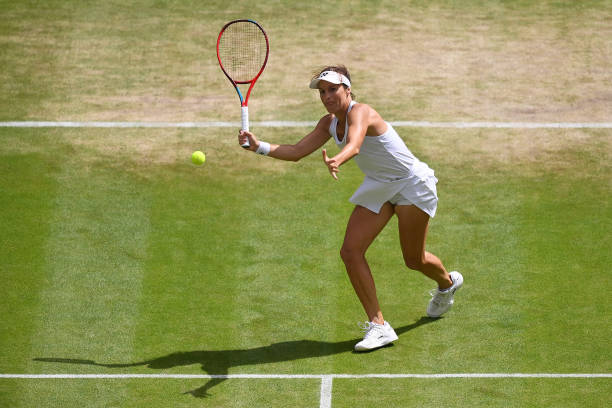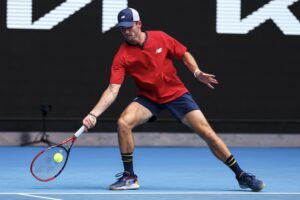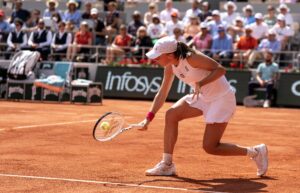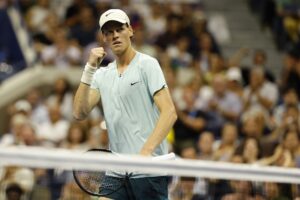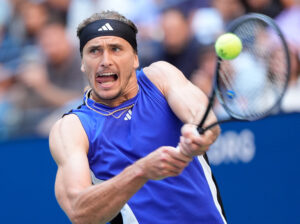“It’s a dream to live this with my family, with my two little girls. I mean, one year ago I just gave birth,” said Tatjana Maria in disbelief after defeating Jule Niemeier 4-6 6-2 7-5 on the No. 1 Court, becoming the oldest first-time Grand Slam semifinalist in the Open Era.
At the end of 2021, few would believe Maria would even be in the main draw at Wimbledon. After giving birth to her second daughter, Cecilia, in April, the German was back playing professional tennis at the end of July. Maria struggled for consistency and would not get back-to-back wins on the ITF tour for the rest of the year, ending up with a 7-15 record.
In need of matches, the 34-year-old chose to enter the exhibition team competition World TeamTennis at the end of November, which would end up being key for her 2022 preparation. Maria earned wins over the likes of Sloane Stephens, Coco Vandeweghe, andKim Clijsters, leading the Orange County Breakers to the championship.
Maria’s ranking dropped quite severely over the course of that season, so she was entering 2022 at No. 279 but with newfound confidence. The 34-year-old entered the Australian Open with a protected ranking and lost to fifth seed Maria Sakkari in two tight sets, an encouraging sign. Just two weeks later, the German would win an ITF 60 in Rome, Georgia as a qualifier, her first ITF title since July 2017.
On April 2nd, exactly a year to the day since the birth of her daughter, Maria won a first qualifying round match over Conny Perrin at a WTA 250 in Bogota. The 34-year-old not only went on to reach the main draw, she left Colombia a champion. After winning her second career WTA title, Maria had to think that altitude clay would bring her the biggest success of the year. But then came Wimbledon.
The Wimbledon Run
“I came here with my two kids for the first time, I was already so happy to be in the main draw!” Maria said in one of her on-court interviews during this amazing run. This was no false modesty, as the German rose up 172 spots over the course of the season to No. 107 with the main draw cut-off at 118.
The German’s slice-happy style with strong serving is very well suited to grass and Wimbledon has been the site of her best previous slam results, a 2015 third-round run in singles and a 2018 quarterfinal appearance in doubles.
“I love to play on grass. It’s such a special place for me because even one year when I was in my first pregnancy, I played pregnant,” Maria said of Wimbledon, the last tournament she played ahead of her 2013 maternity break, less than six months before bringing her daughter Charlotte into the world.
The 34-year-old opened as a favorite against Astra Sharma, closing out Day 1 action on Court 11. The Australian came through qualifying and took the first set before Maria came back to win 6-4 in the third. This was her first victory in the main draw of a slam since US Open 2018, breaking a streak of seven straight first-round slam losses.
Maria then came up against 26th seed Sorana Cirstea, entering with little hope as she had lost all three of their previous meetings. The German jumped away to a 5-0 lead and won the first set 6-3. Cirstea re-grouped though, winning the second set 6-1 and went a double break up in the third. Maria then came back herself and won the hour-long decider 7-5.
That win set up her first match on a show court, facing off with her Australian Open foe Maria Sakkari. The Greek could not deal with how much more effective Maria’s game was on grass in the first set and the German took it 6-3. Sakkari came back stronger in the second, got an early break that she held on to and Maria was serving to stay in the set at 5-2.
The Bad Saulgau native then pulled out some of the very best tennis she has played, winning her serve, breaking back for 5-4, and saving two set points in the crucial tenth game to go 5-5. Maria broke again and held her nerve to serve the match out. The serve was the key to her success throughout the match, winning 75% of her first-serve points and delivering when it mattered as she saved six of seven breakpoints.
Next up was former semifinalist Jelena Ostapenko. At that point in the tournament, the hard-hitting Latvian was considered a favorite to be the player to make it out of that quarter and equal her Wimbledon best. She utterly dominated four of her last five sets in wins over Yanina Wickmayer and Irina-Camelia Begu and her level did not drop against Maria. The German won regardless.
The first set was incredibly tight with both players serving well, dropping just one service game each until 5-6, when Maria failed to convert a game point and lost her serve, giving Ostapenko the first set. The Latvian broke again to begin the second set and held it for a 4-2 lead. Maria got the set tied up at 4-4 with a break back but ended up having to save two match points in her next service game. After holding for 5-5, both the momentum and the crowd were with the German as she won the next two games, tying the match at one set apiece.
After trading early breaks, both players held until 4-4. Ostapenko was on serve and failed to convert three game points before losing the game. Maria did not deal with the pressure of serving for the match and lost the game in a clean break for 5-5. The German broke right back and did not make the same mistake a second time, winning 5-7 7-5 7-5 to advance to the quarterfinals.
Maria came to Wimbledon with her two daughters and husband/coach, speaking about the importance of having her family with her throughout the tournament.
“My guess is they are jumping in front of the TV right now!” The German answered when asked if her children were watching after her victory over Sakkari before sending kisses and waving to them.
“Without him, it would not be possible. He is the one who believes every second [in] me, he’s supporting, he’s giving me the confidence. Without him, I would not be here,” she said of her husband and coach Charles-Edouard Maria, with whom she celebrated their ninth anniversary in April and who helped her develop a strong one-handed backhand later in her career.
Though her daughters have not been present at the matches, Maria has spoken about them and the importance of motherhood in every interview.
“Now, I try to be really a role model for my daughter because she will be the next champion and so I try to show her the best possible,” Maria said about her eight-year-old, Charlotte. The 34-year-old also revealed she has been showing up to the courts at 8:30 in the morning to run practice for Charlotte and her friend throughout the fortnight.
Maria was then set to play the most important match of her career to that point, a Wimbledon quarterfinal. Her opponent would be none other than fellow German and Bundesliga club teammate, Jule Niemeier. The 22-year-old was seen as a slight favorite coming into the match as he had been rising steadily over the past couple of seasons and has more natural power in her game. Niemeier had also been more dominant in her run-in, dropping just one set and taking out second seed Anett Kontaveit.
Like in her last match, the first set was very tight and Maria gave up an early break. This time she never got it back. Despite solid play throughout the set and winning just three fewer points, the 34-year-old lost the first 6-4. Maria lost her first service game again in the second set but was able to break back right away this time. She began gaining momentum and would lose just one more game, breaking Niemeier’s serve twice more to win the second set 6-2.
The 22-year-old earned the first break of the deciding set but Maria would break back for 4-4. The match really took off to another level in terms of quality with stunning rallies coming one after another, such as this one:
When the dust settled, it was the 34-year-old Maria coming out on top, winning 7-5 in the third for the third time in her Wimbledon run.
“I have goosebumps everywhere! It was such a tough match against Jule. I mean she’s from the same country [as] me, we’re both German, and I think today we made Germany very proud after our match,” Maria said in her on-court interview.
What’s next?
Next for Tatjana Maria is a Wimbledon semifinal against the new World No. 2 Ons Jabeur. The Tunisian, now the highest-ever ranked African player, can not only match the German in likeability but also in her on-court variety.
The two know each other very well and are “barbecue buddies,” as Jabeur described them.
“It will be really nice to play Ons because, I mean, a part of our family. She loves my kids, she’s telling me every single day. I mean, she’s playing with Charlotte all the time and she loves Ceci,” said Maria of their upcoming match.
“[Maria] is one of the examples that I wish players would look up to her because she really suffered to play, to win rounds in grand slams, and look at her now. She’s in the semifinals after having two babies. It’s really an amazing story.” Jabeur said of the 34-year-old and what it means to see her reach the semifinals.
The story of Tatjana Maria is one certainly fit for a book when it is all said and done. Had ranking points been awarded at Wimbledon this year, she would have reached a new career high and broken the Top 40. Points or no points, it has been one of the most impressive and surprising runs in Wimbledon history.
“I showed it last time already that I am back. I reached the Top 50 with Charlotte and now I’m back with my second child and still, everybody was doubting. I mean, it’s a little bit my life to show everybody that I’m still here, and I’m a fighter, and I keep going, and I keep dreaming, and that’s what I want to show my kids,” she said in press.
No matter the result in the semifinals, Tatjana Maria has already won. She has become an inspiration not only for her children but for people all around the world.
Main Photo:
Embed from Getty Images


